On View
A Suite of New Sculptures Across London Upends the Idea of Permanence
The latest Fourth Plinth commission, unveiled on Wednesday, is designed to erode over time.
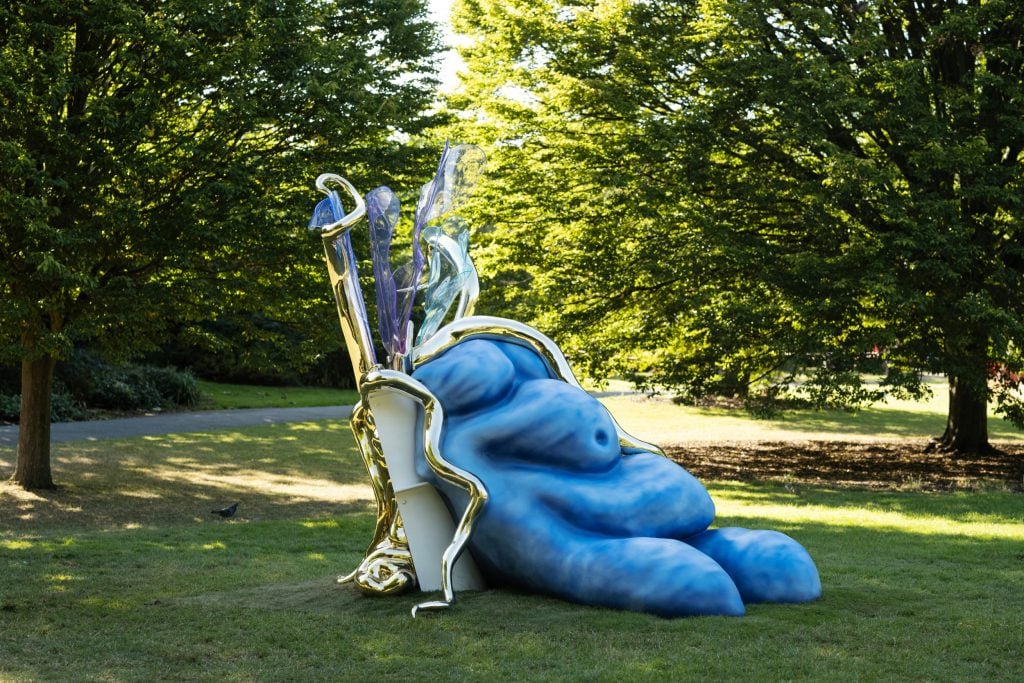
The latest Fourth Plinth commission, unveiled on Wednesday, is designed to erode over time.

Jo Lawson-Tancred

London is suddenly brimming with new public art installations ahead of its third London Sculpture Week, which runs from September 21–29. Among the biggest headline-grabbers is the annual Frieze Sculpture exhibition, which this year sees experimental pieces by artists like Theaster Gates, Yoshimoto Nara, and Zanele Muholi dotted around Regent’s Park, and the always hotly-anticipated unveiling of the latest Fourth Plinth commission.
What many of these varied artworks share this year is a sense of impermanence—which is perhaps counterintuitive for public sculpture, a genre that is traditionally meant to be able to withstand both the elements and the effects of time.
Returning as curator of Frieze Sculpture’s 12th edition, Fatoş Üstek has challenged herself to bring together an impressively wide range of artistic interpretations of sculpture as a medium, embracing a diversity of concepts, materiality, and execution. To this end, the program includes a loose mosaic by Nika Neelova, Juliana Cerqueira Leite’s intricate choreographies of movement, and even surprise performances by FOS. Speculative works like these may merely “allude to a sculptural experience,” the curator said. Guiding audio interpretations are offered via Bloomberg Connects.
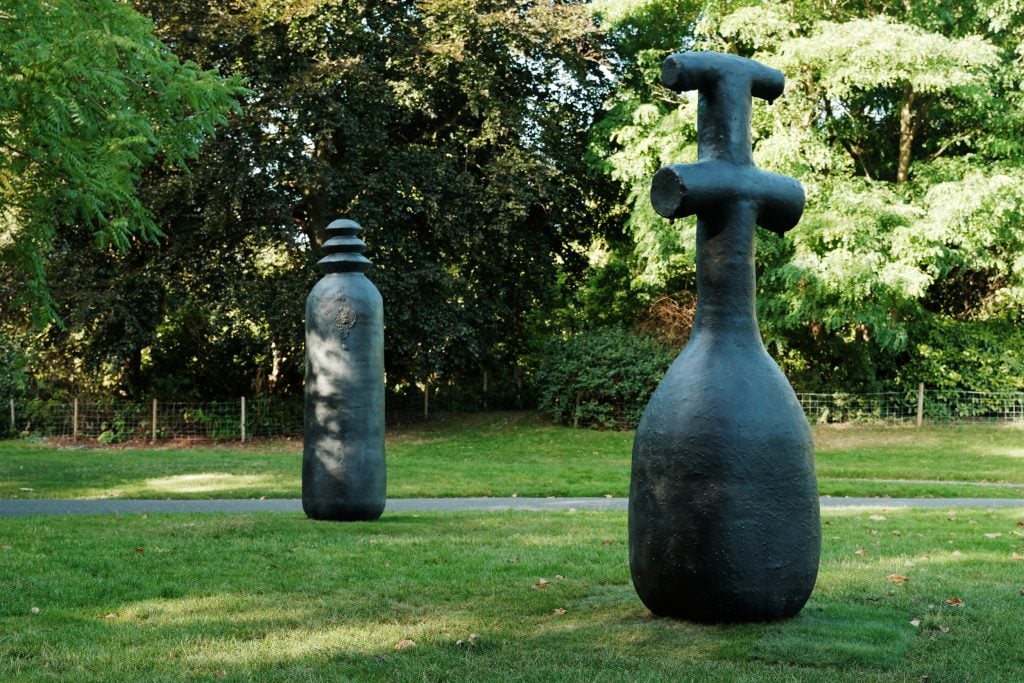
Theaster Gates, The Duet (2023) at Frieze Sculpture 2024. Photo: Linda Nylind, courtesy of Frieze.
“This expandedness is really about pronouncing the difference between the monumentality that we’re very much used to seeing in our cities and the ephemerality that sometimes touches us even more,” Üstek explained at the show’s launch. “This year is for your eyes, but also for your third eye, for your introspective qualities, for your contemplative qualities, or for your forces of imagination.”
One of the most widely discussed works is Ent- (non-earthly delights) by Libby Heaney, who has gained a cult following for complex artworks emerging from her expertise in quantum computing. It is the first sculptural manifestation of an ongoing project inspired by Hieronymus Bosch’s The Garden of Earthly Delights (ca. 1500) but invites viewers to step into the digital realm via two A.R. artworks accessed via Q.R. codes near the sculpture. In one, a virtual sculptural form that appears on screen against the backdrop of the park shifts between different states of completeness before exploding entirely. The artist’s semi-transparent hand can be glimpsed on the screen as well, as if it is extending into the landscape itself.
“The work continues my exploration of quantum hybrid creatures, strange entanglements of human, animal, and machine,” said Heaney. “Future quantum computers will be able to control and create new Frankenstein lifeforms on a scale never seen before.” She added that monsters excite her as “external representations of the parts of us we try to repress that could be brought into the light and celebrated.”
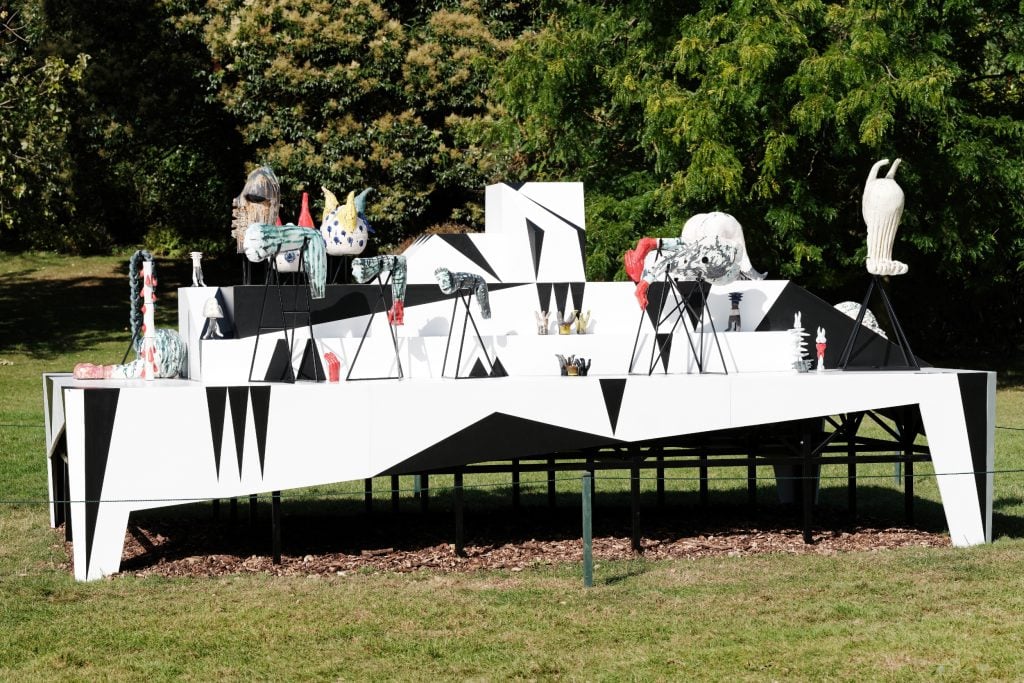
İnci Eviner, Materials of Mind Theatre (2024) installed at Frieze Sculpture 2024. Photo: Linda Nylind, courtesy of Frieze.
Another work that exhibits an unusual conceptual approach is Inci Eviner’s Materials of Mind Theatre, a stage-like platform holding 25 stoneware sculptures that resemble fantastical pieces of costume design. It is activated when a performer takes their place on the stage, animating the otherwise static set and ensuring that the composition is always evolving.
Albano Hernandez’s The Shadow is a particularly surprising work that could very easily be missed, or indeed trodden over. It uses water-based grass paint to darken the ground, which in this case has been applied to record the shadow of a sweet gum tree in the park exactly as it appears in mid-morning. The artist said the work serves as “a reminder that, though we as humans commodify natural resources, changing their aesthetics, their names, and even their qualities, we cannot stop time. Maybe today you are able to see the shadow, but it will soon disappear, like you, like me, like everything.”
Meanwhile, over in central London’s Trafalgar Square, the 15th commission for the Fourth Plinth, one of the city’s most important public showcases for contemporary art, has been unveiled before an expectant crowd.
Mil Veces un Instante (A Thousand Times in an Instant) by Mexican artist Teresa Margolles is a structure that at first glance appears to repeat the rectangular structure of the plinth. On closer inspection, its surface is made up of plaster casts, echoing the Tzompantili, a wooden rack once used by Mesoamerican civilizations to display the skulls of sacrificial victims.
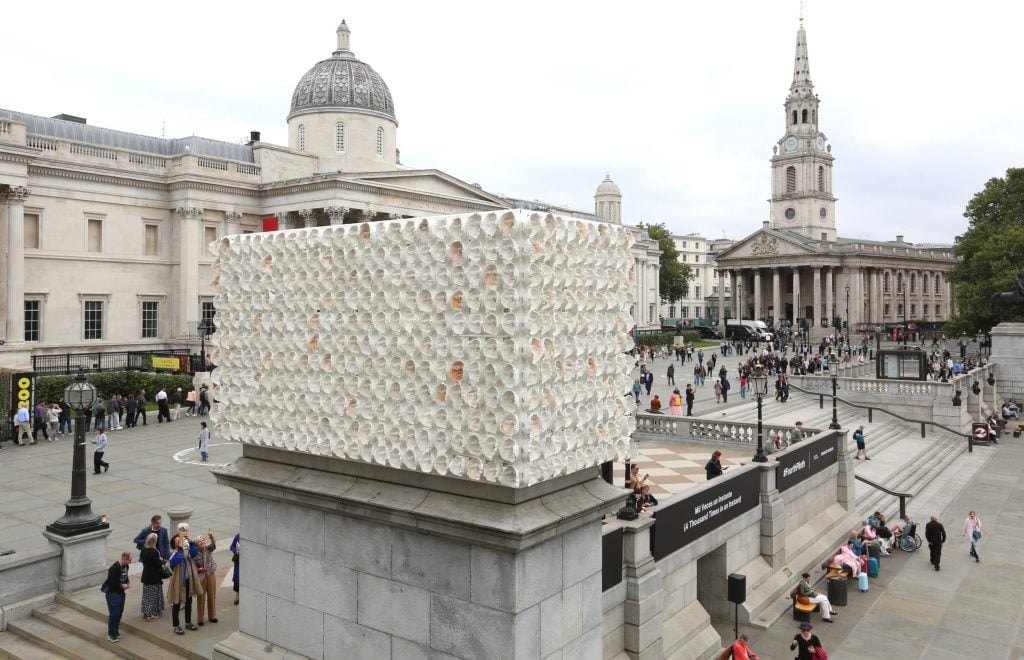
Teresa Margolles, Mil Veces un Instante (A Thousand Times in an Instant) (2024) is the 15th Fourth Plinth commission in London’s Trafalgar Square. Photo: © James O Jenkins.
Each of the faces recorded by Margolles is that of a trans, non-binary, or gender non-conforming person, adding up to 726 participants in total. The work foregrounds the trans community at a time when their existence is often called into question, and is also a poignant tribute to the artist’s friend and collaborator Karla, a trans woman from Mexico who was killed in 2015.
“We pay this tribute to her and to all the other people who were killed for reasons of hate,” said Margolles. “But, above all, to those who live on, to the new generations who will defend the power to freely choose to live with dignity.”
Echoing Üstek’s theme of ephemerality in sculpture, the work is expected to erode over time as it is exposed to London’s infamously wintry weather. In an age where many centuries-old monuments have been toppled by protestors, in most cases because they are not felt to represent the values of contemporary society, it appears that the artists and curators behind London Sculpture Week are excited by sculpture that reflects and exists only for the present moment.
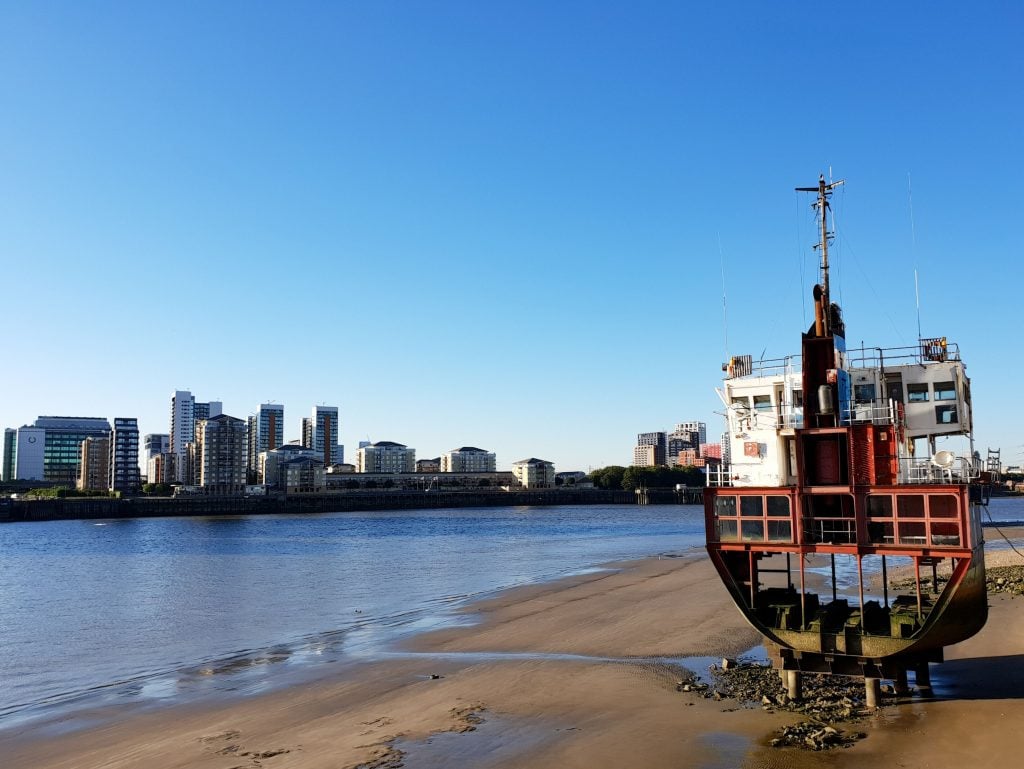
Richard Wilson, A Slice of Reality installed at Greenwich Peninsula as part of The Line in London. Photo: Matt Cuzner.
Other events during the week include The Line, a free public art trail that weaves its way through east London from Greenwich Peninsula to East Bank, where three public art commissions include Michael Landy’s Meringue, a celebration of the region’s Cockney rhyming slang both old and new. Along the way, members of the public will spot pieces by artists like Tracey Emin and Yinka Illori.
Finally, art lovers are encouraged to check out the 13th edition of Sculpture in the City, which opened in July and runs through spring 2025. Ten sculptures by artists like Richard Mackness, Ida Ekblad, Julian Opie, and Samuel Ross are installed in and around the City of London.
London Sculpture Week runs from September 21–29 at locations across the city.